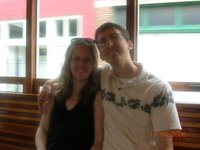
. . . extraordinary changes in form and perspective for painting, sculpture, literature, and architecture . . . the Reformation led by Luther and Calvin . . . the invention of the watch . . . observations of space, the creation of the telescope . . . the newspaper . . .
In seeking a source for this "Renaissance," the culmination of which began in 1492, Edwin Friedman writes:
It is appropriate that this "rebirth" of the human spirit has been referred to as the "Renaissance." But the tendency to attribute the Renaissance to a renewed interest in learning may, despite its origins, be the same kind of academic bias that focuses leadership training programs on data and technique rather than on emotional process. It certainly has not been my experience in working with imaginatively stuck marriages, families, corporations, or other institutions that an increase in information will necessarily enable a system to get unstuck. And the risk-averse are rarely emboldened by data.
Columbus's discovery was the catalyst for the quantum leap we call the High Renaissance. So, getting a gridlocked relationship system unstuck requires not a cognitive phenomena, but imagination and curiosity. Friedman names this spark, if you will, "nerve."
He says, ". . . I believe that the catalyst for those other imaginative breakthroughs was the "nerve" of the great navigators who led the way."
In the midst and wake of Columbus' voyages to the New World, Michelangelo sculpts his David . . . Leonardo completes the Mona Lisa, and Shakespeare! and Galileo!
And I love what he says here to name the history lesson:
The effect of America's discovery on the European imagination was as though God had been hiding a piece of land bigger than the known world since the dawn of creation. The great lesson of this turnaround is that when any relationship system is imaginatively gridlocked, it cannot get free simply through more thinking about the problem. Conceptually stuck systems cannot become unstuck simply by trying harder. For a fundamental reorientation to occur, that spirit of adventure which optimizes serendipity and which enables new perceptions beyond the control of our thinking processes must happen first. THis is equally true regarding families, institutions, whole nations, and entire civilizations.
But for that type of change to occur, the system in turn must produce leaders who can both take the first step and maintain the stamina to follow through in the face of predictable resistance and sabotage.
O Lord, let me never discourage leaders who have this "nerve". Let them teach me imagination and curiosity. Wake me up to their imitation of Jesus, who for the joy set before him endured the cross. Amen.

No comments:
Post a Comment